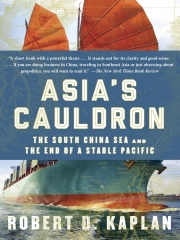Asia’s Cauldron by Robert Kaplan
Every time I come back from a foreign country, I read a book about it. I want to do it afterwards because I don’t want to have any preconceptions. I want my mind to be a blank slate when I first land in a new country. I also find that I get more out of a book when I can link the places the author describes to places I just saw in real life.
After my vacation to Singapore and Malaysia, I thought I would start off by reading about Lee Kuan Yew, but everything I found seemed too heavy. I’ll likely get to Lee Kuan Yew at some point, but this book definitely provided a nice introduction to the politic forces that shape the major countries around the South China Sea.
1) East Asia is really a seascape.
Nowhere in the world is the sea more important in determining regional dynamics. The emphasis is on the navy, not on the land army. It’s also a conflict that has no real moral objective. It largely has no ideological or religious overtones.
2) China is to the South China Sea what the US is to the Caribbean.
Just as the US naturally dominated the Caribbean and drove out the Europeans (with Monroe Doctrine/Roosevelt Corollary), China will come to overpower the South China Sea as it grows economically.
3) In 1947, the KMT came up with an 11-dash line claiming territories in the South China Sea. China currently pursues a 9-dash line claim.
China and Vietnam have signed an agreement over sovereignty claims of the Gulf of Tonkin, and it is no longer part of the cow’s tongue.
4) Finlandization describes the process by which a large country like China overpowers its smaller neighbors while letting them keep their sovereignty.
The term comes from Finland’s relationship with the USSR during the Cold War.
5) The demographic and geographic diversity of Malaysia helps mitigate animosity towards China.
Malaysia consists of both the peninsula and Borneo, the latter of which was dragged into the federation to boost Malay numbers in opposition to the ethnic Chinese population in Singapore. It was quite weird that we had to go through specific checkpoints when we traveled between the peninsula and Sarawak/Sabah.
6) Some of Lee Kuan Yew’s foundational principles were born out of his experience during the Japanese occupation.
Lee Kuan Yew saw that the Japanese were brutal and succeeded. As a result, he advocated for harsh punishment, not soft policies.
7) Morocco and Oman are two Middle East countries that show the possibility of benevolent autocracy.
The author spends time comparing and contrasting the dictator-like leaders of Asia (Lee, Mahathir Mohamad, Chiang) and those of the Middle East. Asia has shown that democracy and freedom do not necessarily go hand in hand. A mix of Confucianism and Islam has succeeded in bolstering Asian countries where leaders have supreme power not at the expense of economic progress.
8) The Philippines is the most underdeveloped major country in the South China Sea.
The Philippines is a de facto American colony, and it’s so weak that China sends nonmilitary boats to signal its influence. The fact that the Filipino land army is larger than the navy is a sign that it’s more focused on domestic issues.
9) Chiang Kai Shek and the KMT transported the most valuable pieces in Beijing over to Taiwan when they fled – this collection is now housed at the National Palace Museum.
I thought the National Palace Museum was quite impressive. It never crossed my mind how all the treasures on display ended up in Taiwan.
10) Chiang was a harsh dictator in the early days of Taiwan, and the Korean War helped Taiwan avoid a Chinese invasion.
There seems to be active debate on Chiang’s role in history. How does one weigh his harsh rule against his role in setting up one of the most symbolic democracies in the world?
Overall, this was a great book on a topic that is very rarely discussed in American media. As the Middle East continues to be a mess, the South China Sea will fall further into the background. Will the US move armed forces out of the region to combat terrorism elsewhere? If so, this would only benefit China. The more time China has, the more influence it will exert over the region.
